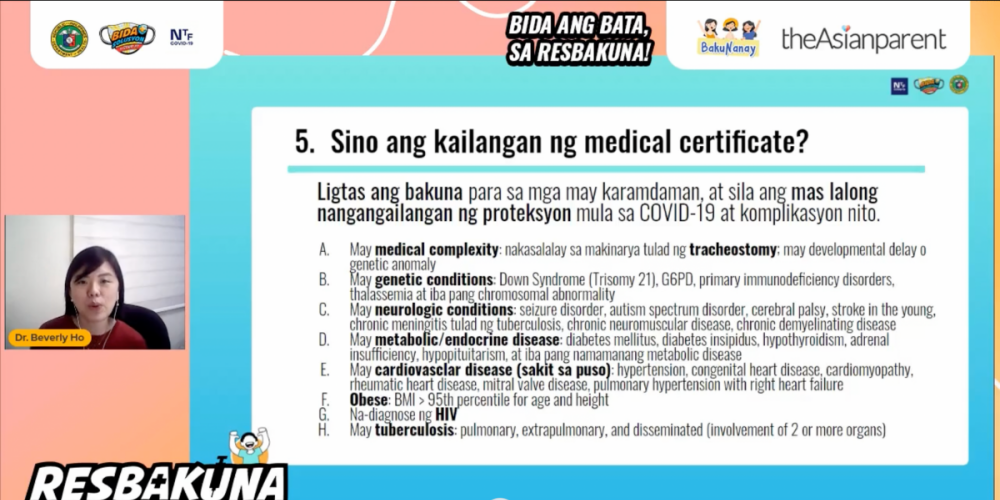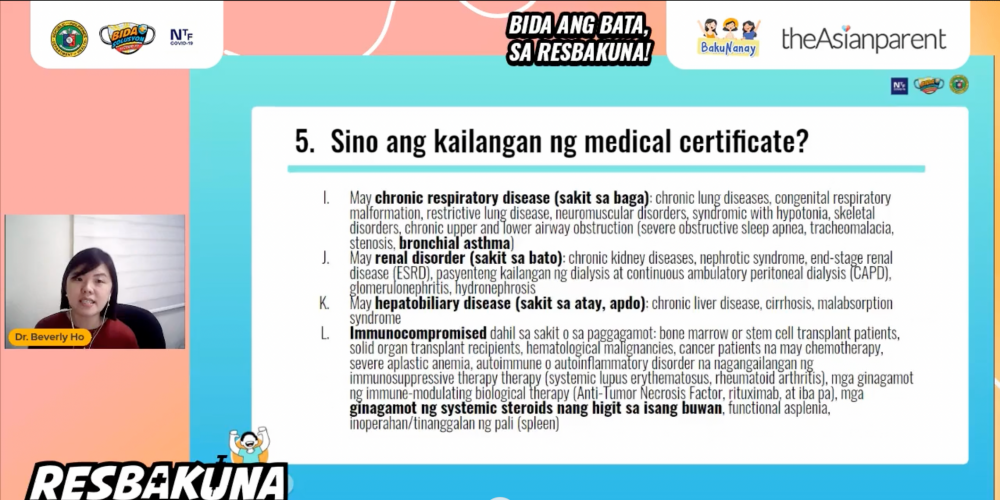Here are things every parent must take note of as vaccination of children vs COVID-19 starts
Children aged 5 to 11 are already eligible to get their COVID-19 vaccines starting Feb. 7. It was originally scheduled on Feb. 4, but has been rescheduled due to "logistical challenges."
Those eager to give their kids a much-needed additional line of defense may still be confused or may have questions regarding the process, but worry not, as PhilSTAR L!fe has compiled the list of things that every parent or guardian should take note of.
I want to vaccinate my children. What's the first thing I should do?
One must first coordinate with their respective local government units to identify the COVID-19 vaccination centers they should visit.
The Department of Health (DOH) highly recommends booking appointments to guarantee slots for the jabs during a specified date to avoid overcrowding.
If it can't be helped, however, the DOH says walk-ins would still be accepted.
To date, there are six vaccination sites for the pediatric vaccination's kick-off:
- Philippine Heart Center
- Philippine Children’s Medical Center
- National Children’s Hospital
- Manila Zoo
- SM North Edsa (Skydome)
- Filoil Gym (San Juan City)
The six sites would be part of 32 vaccination centers in Metro Manila that would initially cater to 5- to 11-year-olds on Friday.
Select areas in Cavite, Laguna, Batangas, Rizal, Quezon province, and Central Luzon will follow suit starting Feb. 7.
What are the requirements that I should bring during vaccination day?
The DOH said parents must bring a document that proves their relationship with their children, such as a birth certificate or a baptismal certificate.
They must also present valid identification cards of themselves as well as their children's. If the child does not have a valid ID yet, the DOH said barangay captains can serve as witnesses in proving filiation.
Parents may also be required to secure clearance from their doctors first, if their children have comorbidities.
During the "Bakuna Real Talks: Resbakuna Kids Orientation on Pediatric Vaccination for Children Aged 5-11" last Jan. 31, the DOH and Filipino parent organization theAsianParentPH shared a list of medical conditions that may need medical certificates.


The DOH assured the public that COVID-19 vaccines are safe and won't exacerbate what's on the list.
The DOH also reminded those going to vaccination centers to wear well-fitted face masks and to have ballpens on hand, as medical staff won't allow borrowing of pens in the venue to lessen contact.
Other necessities like rubbing alcohol or bottled water must not also be forgotten.
I can't accompany my child. Can a guardian or relative go in my stead?
A guardian or relative may accompany the child, but aside from the requirements mentioned above, they must also present a special power of attorney (SPA), a document that authorizes another individual to make legal decisions on their behalf.
This is necessary, as the accompanying parent is expected to fill out and sign forms during the child's vaccination.
If an SPA is unavailable, the guardian or relative must present any of the following:
- notarized authorization letter from the parent
- affidavit of parent under oath with the notary public or authorized official
- barangay certification from barangay captain
They must also bring a valid government ID.
I want to vaccinate my child against COVID-19, but are there exemptions?
While COVID-19 vaccines are generally safe for everybody, the DOH said those in quarantine or isolation while battling the disease may not receive their jabs.
Children aged 4 and below may not also take their COVID-19 vaccines, as the present EUA or emergency use authority from the local FDA allows administering the jabs only to children aged 5 to 11, adolescents aged 12 to 17, and adults.
Children who may be allergic to vaccine ingredients, like polyethylene glycol or PEG and polysorbate, may not be able to get their COVID-19 shots.
What's the vaccine brand that my child will receive?
Pfizer-BioNTech's COVID-19 vaccine will be administered to kids aged 5 to 11, as it's the only brand issued with an EUA by the local Food and Drugs Administration.
Like previous guidelines, the children will receive a two-dose series, with a 21-day interval.
But their jabs would have lower dosage and concentration compared to the previous ones being administered to adolescents aged 12 to 17 and the adults.
Would my child experience side effects?
The DOH said children are expected to experience side effects like adults who have received the COVID-19 vaccines before.
The agency, however, noted that it should just be mild reactions that won't last longer than 48 hours.
Common side effects after receiving COVID-19 vaccines include:
- tenderness, pain, warmth, redness, itching or swelling on the arm where you got the injection
- generally feeling unwell
- feeling tired (fatigue)
- chills or feeling feverish
- headache
- joint pain or muscle ache
In any case, the DOH, as well as other health authorities like the World Health Organization and the United States Centers for Disease Control and Prevention have time and again assured the public that COVID-19 vaccines are safe and effective.
My child doesn't want to get vaccinated. What should I do?
In a webinar on pediatric vaccination last January, Dr. Eric Tayag of the DOH Knowledge Management and Information Technology Unit stressed on how important it is to get vaccinated against COVID-19.
Tayag urged parents to convince their children about the benefits of getting COVID-19 jabs.
"Kailangan maintindihan ng mga bata na ito ay proteksiyon para sa kanila at sa mga kasama nila sa bahay," he said. "Kasama na rin iyong mga kalaro nila, kung balang araw mababalik ang paglalaro sa ibang bata."
The doctor advised parents to be creative in explaining COVID-19 vaccines to their kids, such as through photos and videos. They must also be careful in using words that may cause fears, such as "turok" or "tusok."
During vaccination day, Tayag also suggested "distracting" the kids when they're about to get their shot. In case they start crying during the procedure, he said parents must be prepared to comfort them.
After getting their COVID-19 vaccines, Tayag said parents may consider giving their children a sort of gift.
"Hindi ito suhol, ha," he noted. "Talagang bibigyan natin sila ng bagay na maaari pong ikatuwa nila."
Tayag also pointed out how important it is to not miss the schedule for the second dose, noting that there may be children who don't want to return to the vaccination site after a possible harrowing experience during their first dose. Parents, he said, must be patient enough to make their children understand the importance of completing the vaccine's two-dose series.
After my child gets vaccinated against COVID-19, should I skip other vaccines?
The DOH strongly recommends getting vaccinated against other diseases, since COVID-19 is not the only threat in this world. Among those that children must take include vaccines for measles-rubella and tetatus-diphtheria.
The agency reminds the public that a COVID-19 vaccine recipient may receive another vaccine after 14 days, but this interval may be shortened upon the advice of a doctor.
Other family members have already been vaccinated against COVID-19, why should I include my kids?
The DOH reiterated that a fully vaccinated individual, even those with booster shots, could still carry the virus and could pass it onto others, including children.
The agency said it's best to get vaccinated against the disease as soon as possible, as COVID-19 vaccines prevent severe symptoms and hospitalization, even death.


